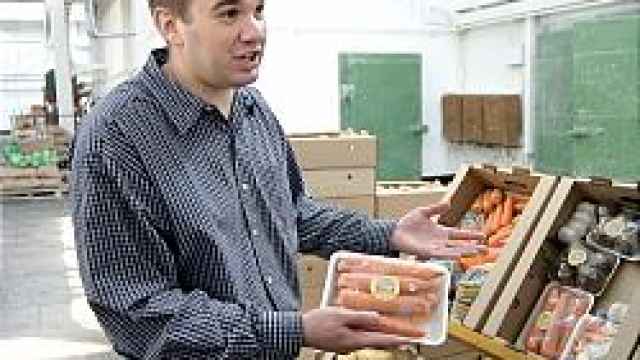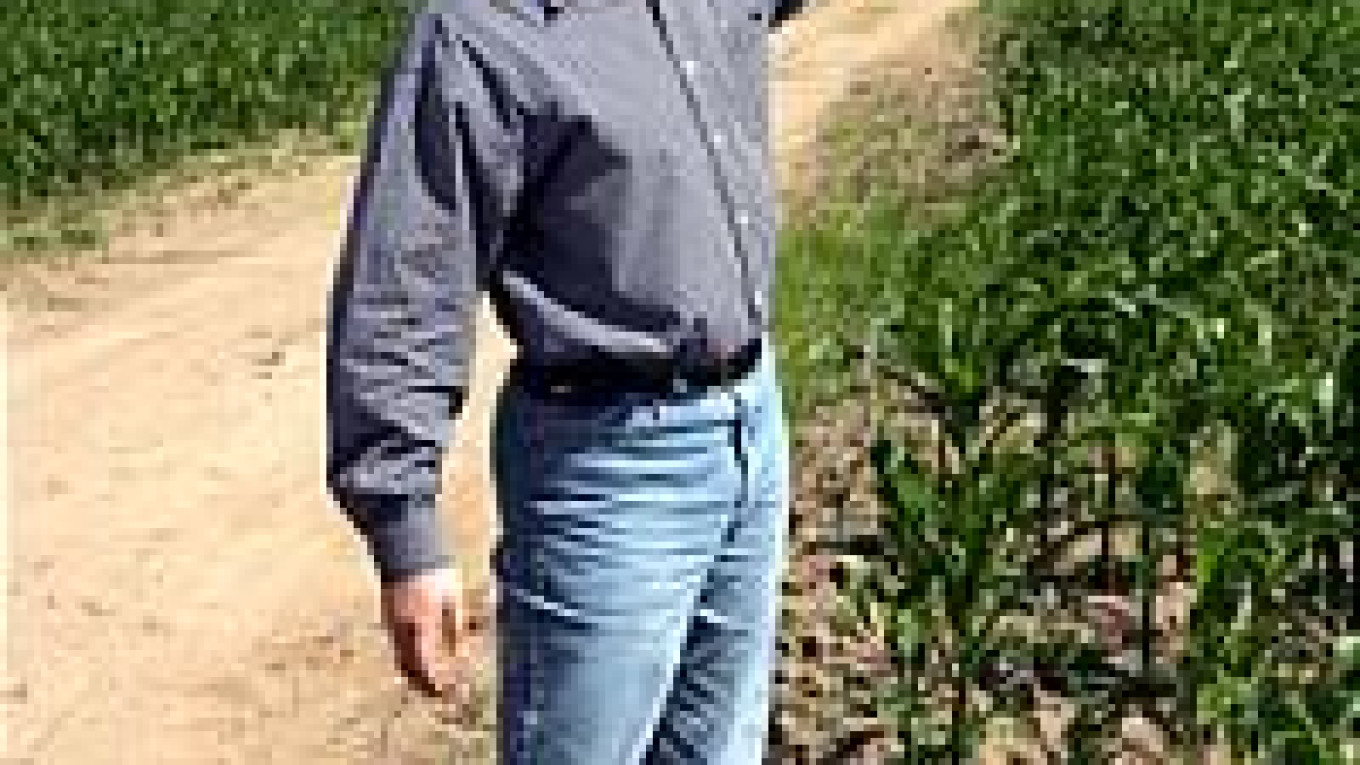"I love looking at this," he said, speaking in English with a strong American accent and trying, not completely successfully, to inspire a visitor to look with the same enthusiasm at the rows of healthy looking vegetables spread out before them.
Danilenko, 36, is the man behind Russkiye Fermy, or Russian Farms Companies, a firm that brings fresh vegetables, cleaned and chopped, to many of Moscow's supermarkets.
Initially born as a nonprofit organization providing funds to isolated farmers, Russian Farms is now also a business that has revived a dying farm and is expanding fast.
Danilenko, a U.S. citizen born to Russian parents in San Francisco, had the unusual journey of coming to Russia as a small child in 1975, leaving as a teenager in 1985 and finally returning for good in 1989.
"I thought we'd donate a few tractors, some farming equipment," he said, "Little did I know that it would change my life."
Danilenko is now in charge of a $10 million business that controls produce from growth, to storage and eventual delivery to supermarkets. The company predicts sales of $25 million within three years, up from $6 million this year.
"It's a leading organization that shows the potential of Russian agriculture," said Randall Hager, the senior agricultural attache at the U.S. Embassy. The U.S. Department of Agriculture has supported Russian Farms by providing its American parent company Russian Farm Community Project two years ago with 84,000 tons of corn, which were then sold to fund the various educational and development work that the company is involved in.
"We realized the primary problem was not a lack of money. The main problem was no infrastructure," Danilenko said.
The lesson was a swift one. Some of the funds given to farmers were wasted -- one farmer bought himself an Alfa Romeo.
"The only way to help people is to provide a sustainable model. If you provide a loan then they become dependent and become helpless," Danilenko said.
Russian Farms bought the farm, located a few kilometers away from the city of Dmitrov, 80 kilometers north of Moscow, for $2.5 million in 1997. It has a 49-year lease on the 1,300-hectare farm.
The farm was rundown, overstaffed and deeply in debt when Danilenko came in. He has transformed it into a modern farm packed with expensive equipment, while slashing the number of farmhands by about 100 to 65.
Anyone wanting to take over the farm would have met resistance, and a foreigner with big plans faced even more.

Ruslan Kochetkov / For MT Andrei Danilenko, 36, inspecting some produce grown on his 1,300-hectare farm, which he bought in 1997 for $2.5 million. | |
"Anyone not born in that community is going to be an outsider. We are always perceived as a foreign entity even if all of us are Russian," Danilenko said.
"They could care less who is president. They care about the opinion of their neighbors. If I come in and punish a neighbor for stealing or drinking on the job, I automatically become an enemy. I may be right, but I offended the neighbor.
"My psychotherapy is to drive into the field. I get into a fight at least once a day. ... Plants don't talk back to you."
A former government base used for storing food reserves after the start of World War II is located 20 minutes by car from the farm. The base has been turned into Russian Farms' distribution center, delivering fresh produce to supermarkets like Perekryostok every morning. The vegetables are sold under the label Kladovaya Solntsa, or Storehouse of the Sun.
Warehouses that lay disused and grubby a few years ago are now full with potatoes and cabbage. New technology for packing and cleaning the vegetables stands alongside the older, more labor-intensive methods.
"Everybody's dream is to go into a time machine and go forward and take advantage of technology," Danilenko said. "Here in Russia you have the opportunity."
At the farm, the field of carrots yield 50 tons per hectare and potatoes 30 tons per hectare -- three times more than other local farmers. Yields can go up to 100 tons per hectare for carrots and 60 tons for potatoes.
"This is the worst land in the area," Danilenko said, with glee. "What if we had the best?"
Danilenko showed off what he said is one of the most technologically advanced dairies in the country. He said it produces three times more milk than the average dairy farm.
Instead of being kept indoors at great expense, the cows live in a huge open barn all year round. Mesh curtains are pulled down when the weather turns cold.
"No one believes it will work in the super cold of Russia," Danilenko said.
But, he insisted, good feeding and management does improve yields.
The farm has imported 230 dairy cows from the Netherlands and expects 290 more to be delivered in September.
A farming family from the U.S. state of Wisconsin will soon move into a three-room house that is being built next to the dairy.
There are ambitious plans to expand to as many as 10 dairies in the next 10 years.
Danilenko is married and has two young children, who spend the summer living near the farm and the rest of the year in Moscow.
Where does he feel most at home? "I'm American," Danilenko said, "but I feel culturally Russian. ... And it is American technology that has helped me in the business."
A Message from The Moscow Times:
Dear readers,
We are facing unprecedented challenges. Russia's Prosecutor General's Office has designated The Moscow Times as an "undesirable" organization, criminalizing our work and putting our staff at risk of prosecution. This follows our earlier unjust labeling as a "foreign agent."
These actions are direct attempts to silence independent journalism in Russia. The authorities claim our work "discredits the decisions of the Russian leadership." We see things differently: we strive to provide accurate, unbiased reporting on Russia.
We, the journalists of The Moscow Times, refuse to be silenced. But to continue our work, we need your help.
Your support, no matter how small, makes a world of difference. If you can, please support us monthly starting from just $2. It's quick to set up, and every contribution makes a significant impact.
By supporting The Moscow Times, you're defending open, independent journalism in the face of repression. Thank you for standing with us.
Remind me later.


